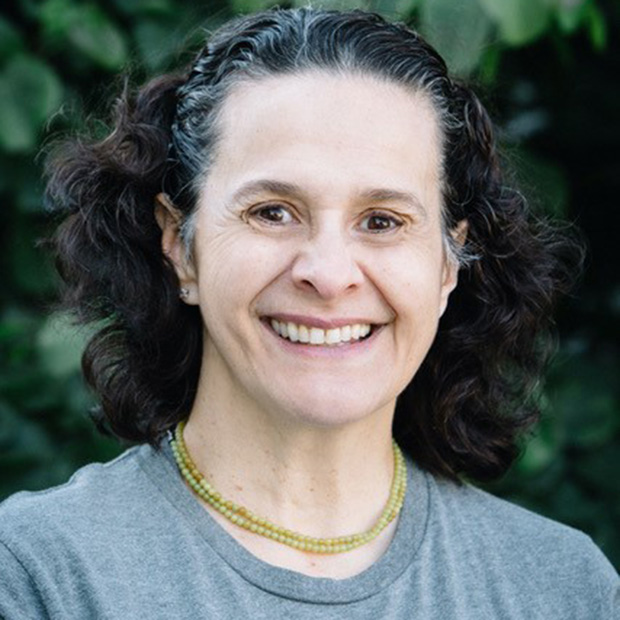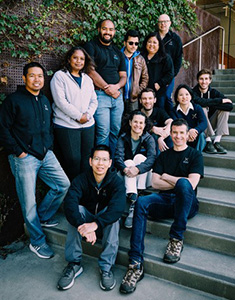Technology pioneer
June 20, 2023 — By nearly any measure, Eugenia Corrales ’87 isn’t your typical CEO. By Silicon Valley standards, she’s an absolute rarity.
Female and Hispanic – Corrales was born and raised in Costa Rica – she has had leadership roles at tech giants Hewlett-Packard and Cisco; has started and sold her own company; and been called in to help several startups grow and flourish.
 Eugenia Corrales ’87
Eugenia Corrales ’87
In recent years, she’s been at the helm of Berkeley, California-based Nefeli Networks, a cloud network management company started by three academics who turned to Corrales to transform their research into a successful product.
One other thing that makes her different: While the average U.S. CEO is 6 feet tall (according to popular surveys) Corrales comes in at a petite and very confident 5 feet, 5 inches.
A physics major at Grinnell with a master’s degree in mechanical engineering from Stanford, Corrales has spent a lifetime blazing trails. “I was always a STEM (Science, Technology, Engineering, and Math) kid,” says Corrales, who wanted to attend college in the U.S. because there were more opportunities for female engineers. She was influenced and encouraged by her father, a mechanical engineer, and her mother, a University of Costa Rica botany professor, academic dean, and the nation’s first female minister of science and technology.
“There were barriers people would put in front of me and I would ignore them,” Corrales says. “When people tried to limit me, I would think, ‘My mom did it, so I can do this.’”
As a teenager taking college physics in Costa Rica before coming to Grinnell, a professor told her she’d be wasting a spot in his class by attending. Corrales spoke to the department dean and was moved to another class where she thrived.
At Grinnell, things were much different. Though women physics majors were a rarity – Meg Philpot ’86, who was on the swim team with Corrales was one of the few others at the time – “I always felt included. At Grinnell, we were all in it together, with the professors.”
She cites her mentors Professor Emeritus of Physics Charlie Duke, and her advisor Professor Emeritus of Physics Bob Cadmus. “They were wonderful teachers and they helped me prepare for graduate school,” says Corrales. She also credits her tutorial advisor, Professor Emerita of Education Roberta Atwell, as another important influence. “I’d go back to her when things were rough, and she would pump me up and help me take on the world.”
And she cites then-Forum manager Jenny Erickson, “who was such a great role model, always positive and a tremendous leader.” The Forum was important for another reason: Corrales met Fred Christians ’87 her second year at Grinnell when they both worked there. The two have been together ever since.
Christians is a molecular biologist and multi-patent holder who works for Karius, an infectious disease screening company. The couple have two sons: Nicholas Christians, a mechanical engineer working on his MBA, and Peter Christians, a recent Haverford College grad working in financial technology.
 The Nefeli Networks team
The Nefeli Networks team
In her professional life, says Corrales, she’s been fortunate “to have had a series of mentors who could see my capability. Those are the people you want to work with, who can see beyond being female, or Hispanic, or whatever they think that an employee should look like or what school they should go to.”
Corrales was hired by HP while she was still completing her degree at Stanford. As a development engineer – “a mechanical engineer that can code,” Corrales explains – she did software and hardware development of technologies that fed into computers, printers, medical instrumentation, and other products.
At Cisco, Corrales worked as general manager and vice president of Cisco’s Computing Systems Group and was vice president of product operations. At one point she was responsible for Cisco’s UCS (Unified Computing System), a multibillion-dollar business. Other leadership roles have included senior vice president at ShoreTel, CEO of Nanosolar, CEO and co-founder of Sunmodular, and vice president of engineering for SolFocus.
“I’ve worked for small, medium, and big companies and the advantage of small companies is that you have a very big impact,” she says. “Every day you come in, it matters, and I really enjoy that. I like feeling that all that energy and effort I put in is impactful. I think I’ll do startups for the rest of my career. Having said that, I worked at big companies for 21 years, was well-treated and was really well-trained. And I learned a lot from very smart people.”
“I would absolutely encourage Grinnellians to work in Silicon Valley,” Corrales adds enthusiastically. “Figure out what interests you and research what companies are doing that work. Send unsolicited resumes and tell them why you’re excited about the company. I’ve gotten so many jobs that way. Don’t wait for them to come to you. And take advantage of the alumni network. You have to take the initiative.”
— by Anne Stein ’84